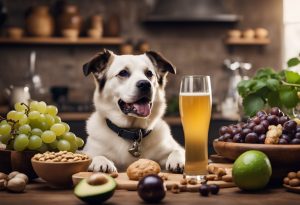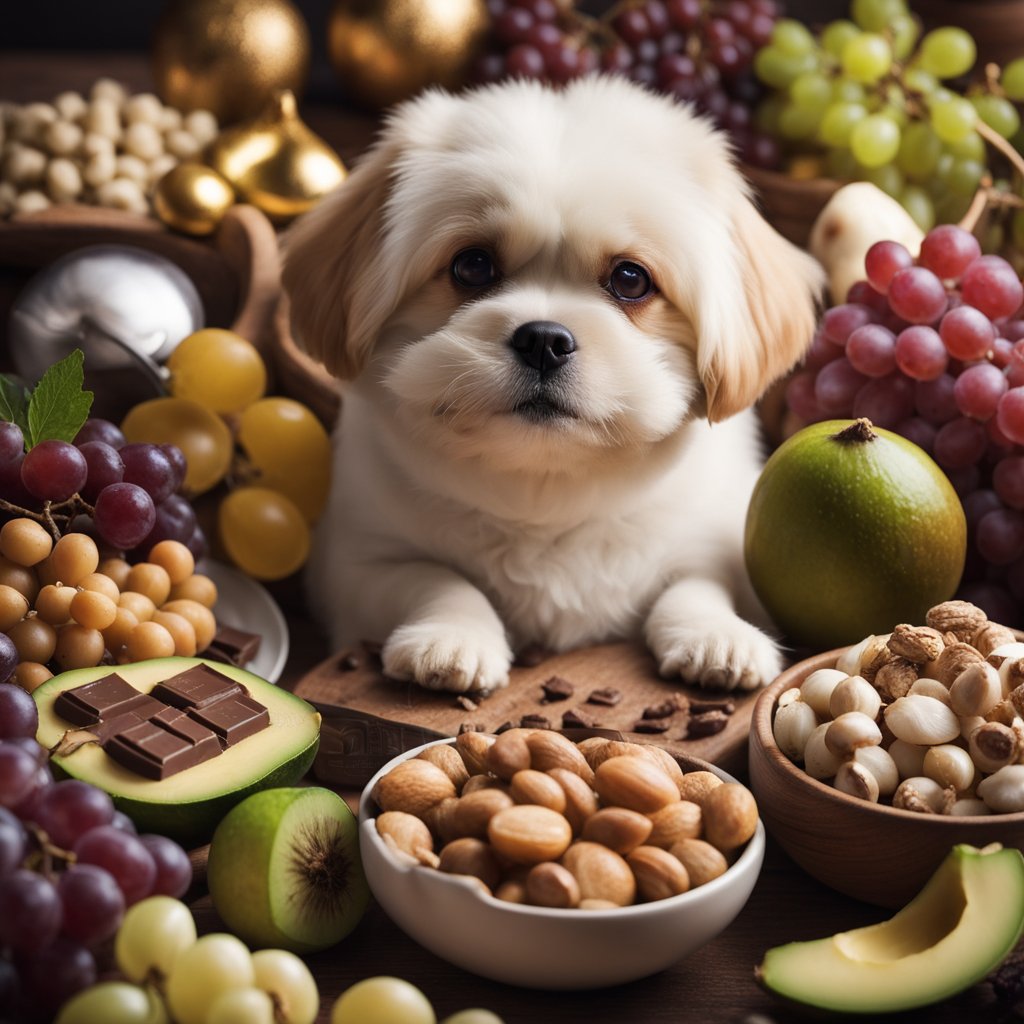What Are the 10 Most Toxic Foods for Dogs? Identifying Dangers for Your Pet
Dogs are often curious about what their owners eat, but some human foods can be extremely harmful. Knowing the 10 most toxic foods for dogs can help you keep your furry friend safe and healthy. By being informed, you can avoid common pitfalls that might lead to serious health issues for your pet.

Every pet owner should be aware that even a small amount of certain foods can be dangerous. Familiarizes yourself with both widely known dangers like chocolate and more obscure threats such as certain nuts and plants. It’s essential to protect your dog by understanding which foods to keep out of reach.
By taking the time to educate yourself about these toxic foods, you can reduce the risk of poisoning and ensure a longer, healthier life for your pet. Your responsibility as a dog owner includes keeping their environment safe and being aware of the food risks that exist.
Key Takeaways
- Certain foods can cause severe health risks to dogs.
- Understanding food dangers helps prevent poisoning incidents.
- Keeping harmful foods away safeguards your pet’s health.
Common Toxic Foods for Dogs

Certain foods that are safe for humans can be extremely dangerous for dogs. Being aware of these toxic foods can help you keep your pet safe and healthy. Here are some common toxic foods you should avoid giving to your dog.
Chocolate and Caffeine
Chocolate is one of the most harmful foods for dogs. It contains theobromine, which dogs cannot metabolize effectively. Even small amounts can cause vomiting, diarrhea, and increased heart rate. Dark chocolate and baking chocolate are especially dangerous.
Caffeine, found in coffee and tea, is also toxic. Like theobromine, caffeine can stimulate the nervous system and lead to restlessness, rapid breathing, and heart palpitations. Keep all chocolate products and caffeinated drinks out of your dog’s reach.
Xylitol and Artificial Sweeteners
Xylitol is a common sugar substitute found in many sugar-free products. It is highly toxic to dogs, even in small quantities. When ingested, xylitol can cause a rapid release of insulin, leading to hypoglycemia, or low blood sugar. Symptoms include weakness, tremors, and seizures.
Be cautious with foods, gums, and baked goods that contain xylitol. Always read ingredient labels to ensure your dog is safe from harmful sweeteners. Ensure that your pets don’t consume any products containing artificial sweeteners.
Grapes and Raisins
Grapes and raisins are known to be dangerous for dogs, though the exact toxic substance is still unknown. Even small amounts can lead to severe kidney failure. Dogs can show symptoms such as vomiting, diarrhea, lethargy, and loss of appetite.
If your dog accidentally eats grapes or raisins, seek veterinary attention immediately. It’s crucial to keep these fruits away from your dog, as they can be found in many common foods.
Onions and Garlic
Onions and garlic are part of the Allium family and can be harmful to dogs. They contain compounds that can damage red blood cells, leading to anemia. Symptoms may include weakness, lethargy, and pale gums.
Both raw and cooked forms are toxic, so it’s essential to avoid giving your dog any dishes containing these ingredients. Small amounts can be harmful if consumed over time, so vigilance is key in your dog’s diet.
Alcohol and Yeast Dough
Alcohol is toxic to dogs, even in small amounts. It can cause a range of problems, including vomiting, diarrhea, and difficulty breathing. In severe cases, it can lead to coma or death. Be careful not to leave alcoholic drinks unattended where your dog could access them.
Raw yeast dough is also dangerous. When ingested, it can rise in your dog’s stomach, causing painful bloating and even rupture. If your dog eats dough, it’s essential to seek veterinary care immediately to avoid serious complications.
Other Hazardous Foods and Substances

There are several other foods and substances that can also be harmful to dogs. Understanding these risks is key to keeping your pet safe from potential dangers in your kitchen and pantry.
Avocado and Persin
Avocados contain a substance called persin, which can be toxic to dogs. While the flesh of the avocado is generally considered safe in small amounts, the pit and skin are not. Persin can cause respiratory issues, fluid accumulation in the chest, and gastrointestinal upset.
If your dog eats a large amount of avocado, it could lead to more severe health problems. It’s best to keep avocados out of reach to avoid any accidental consumption.
Macadamia Nuts and Other Nuts
Macadamia nuts are particularly toxic to dogs. Just a small amount can lead to severe symptoms, including weakness, tremors, and elevated body temperature. Other nuts, such as pecans and walnuts, can also cause digestive issues and pancreatitis.
Avoid giving your dog any nuts as treats. Always check labels on mixed nuts to ensure your dog doesn’t inadvertently eat something harmful.
Fatty Foods and Bones
Fatty foods can lead to pancreatitis in dogs, which is a serious and painful condition. Common fatty foods include greasy meat, bacon, and some table scraps. Symptoms may include vomiting, diarrhea, and abdominal pain.
Additionally, bones—especially cooked ones—can splinter and cause blockages or tears in the digestive tract. Always opt for dog-safe treats instead.
Salt and Salty Snack Foods
High salt intake can lead to excessive thirst and urination in dogs. In extreme cases, it can cause sodium ion poisoning. Symptoms include vomiting, diarrhea, and even seizures. Processed snack foods like chips or pretzels are particularly high in salt.
It’s advisable to avoid giving your dog any salty snacks. Instead, offer fresh fruits or vegetables as a safer alternative.
Milk and Dairy Products
Many dogs are lactose intolerant, meaning they have difficulty digesting lactose found in milk and dairy products. Giving your dog milk can lead to gastrointestinal upset, causing symptoms like diarrhea and gas.
Cheese may be better tolerated in small amounts, but it’s still not recommended as a regular treat. Stick to dog-friendly treats for their health and comfort.
Resources

To keep your dog safe, it’s essential to know which foods are toxic. Here’s a list of crucial resources you can explore for more information.
- Toxic Foods for Dogs: Understand the most harmful foods like chocolate and grapes. Find details in this article on 10 Toxic Foods for Dogs to Avoid.
- Foods Poisonous to Dogs: Learn about a broader range of harmful foods including garlic and wild berries. Check out the list in 30 Foods Poisonous to Dogs.
- Alcohol and Pets: Alcohol is dangerous for dogs, even in small amounts. Read more about this in the article on 10 Toxic Foods for Dogs.
- Allium Vegetables: Onions and garlic can harm your dog’s health. For more specifics, visit 10 Foods that are Dangerous for Dogs.
These resources will help you gather relevant information and keep your dog safe from toxic foods. Always consult with your veterinarian if you suspect your dog has eaten something harmful.
Frequently Asked Questions

Dogs can be curious about what they eat, which can lead them to foods that are dangerous or even deadly. Knowing which foods are toxic can help keep your dog safe and healthy.
Which human foods could be fatal to dogs?
Certain human foods can be extremely dangerous for dogs. Chocolate, grapes, and xylitol are among the top foods that can lead to severe health issues or even death.
What are common household foods that are dangerous to dogs?
Common items like onions, garlic, and raisins are often found in households but should be avoided for dogs. These foods can cause various health problems, including digestive issues and poisoning.
What specific meats should dogs avoid for their safety?
While many meats are safe, you should avoid giving your dog raw or undercooked meats. Specifically, meats like pork can carry parasites that are harmful to dogs.
Can you list some toxic foods that dogs should never consume?
Dogs should never consume foods like macadamia nuts, avocado, and caffeine. These foods can cause serious health risks and should be kept out of their reach.
Which foods can cause immediate harm to a dog’s health?
Foods such as chocolate and xylitol can lead to immediate health threats. Symptoms may arise quickly, requiring prompt veterinary attention.
What items commonly found at home pose a risk to dogs if ingested?
Common household items like alcohol, essential oils, and certain plants can be quite dangerous. Always be cautious about what is accessible to your dog to prevent accidental ingestion.

